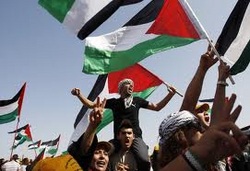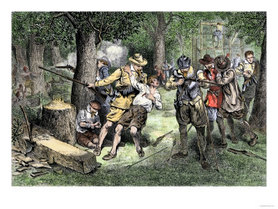The Theme: Political Conflict

All throughout history, we have seen political conflicts emerge and rip nations apart, create them, and sometimes even improve them. The Israeli-Palestinian conflict is just another modern-day example.
The definition of the word political is "Of or relating to the government or public affairs of a country." The definition of the word conflict is "An incompatibility between two or more opinions, principles or interests." From these definitions, you can tell that political conflict is a clash of ideas and/or forces that are related to the government. The Israeli-Palestinian Conflict is a political conflict because it is a clashing of two sides with opposite ideas about their government in the same region. The two sides are the Palestinians and the Israelis.
Although political conflicts become extremely heated and often very hard to control, they are usually consequences for them, either positive or negative. For instance, when the North American colonies of Great Britain opposed British government, they were instigating a political conflict that resulted in the formation of a new country, the United States of America. However, not all consequences of political conflicts are positive, like the bloody revolutionary war that the USA fought as a result of the political conflict with the British.
Political conflicts get very complicated, much like the Israeli-Palestinian conflict we witness today, and it may seem at times that the opposing sides may never reach an agreement, there has been similar conflicts in the past that have come and gone.
The definition of the word political is "Of or relating to the government or public affairs of a country." The definition of the word conflict is "An incompatibility between two or more opinions, principles or interests." From these definitions, you can tell that political conflict is a clash of ideas and/or forces that are related to the government. The Israeli-Palestinian Conflict is a political conflict because it is a clashing of two sides with opposite ideas about their government in the same region. The two sides are the Palestinians and the Israelis.
Although political conflicts become extremely heated and often very hard to control, they are usually consequences for them, either positive or negative. For instance, when the North American colonies of Great Britain opposed British government, they were instigating a political conflict that resulted in the formation of a new country, the United States of America. However, not all consequences of political conflicts are positive, like the bloody revolutionary war that the USA fought as a result of the political conflict with the British.
Political conflicts get very complicated, much like the Israeli-Palestinian conflict we witness today, and it may seem at times that the opposing sides may never reach an agreement, there has been similar conflicts in the past that have come and gone.
Native American Conflict with Colonists

Christopher Columbus found America in 1492, and colonization started less than a century after, but there were already people living there! At first, relations were fairly peaceful between the Native Americans and European colonists, but after some time of them taking advantage of the Native Americans, war broke out between the groups and the Native Americans were forced out of their homes, losing much of the land they had previously lived on. This political conflict emerged when colonists entered America and, in their expansion, pushed Native Americans to poorer conditions and new homes.
The Israeli-Palestinian Conflict, even though it happened in a completely different part of the world at a completely different time, is similar in many ways to how the colonists "invaded" America. For instance, the Native Americans lived in North America for thousands of years, much like the Palestinians, who had lived in their land for almost as long. The colonists that came from Europe, like the Jews also coming from Europe after the Holocaust, came in small numbers at first. In a way, the Jews and the colonists were both generally forced out. Criminals and indentured servants often had to migrate to America, and Jews basically had to migrate to Israel because of the Holocaust and anti-semitism in Europe. Both the Palestinians and the Native Americans were hostile towards them in the beginning, but the Palestinians continued hostility for some time, unlike the Native Americans. The Native Americans had well-established villages and settlements in the area, like the Palestinians in Palestine, and when the colonists arrived, they needed room for expansion, destroying forests and other resources that the Native Americans required in order to live. The Jews also founded and extended settlements in Israel when they arrived there.
However, in both scenarios, tension built up, and more large-scale violence emerged. In the Israeli-Palestinian conflict, it was against the Arabs supporting the Palestinians. In the conflict of the Native Americans, the colonists started to burn native crops, villages, and even killed some Native Americans. Although the colonists are often viewed as the aggressors in history (much as the Jews are viewed as aggressors in Israel), both sides eventually committed atrocities against each other, which is much like the Israeli-Palestinian conflict today and throughout history, where both sides are brutal towards each other.
We know from history that the Native Americans were crushed in their battles with colonists, because of a lack of technology. The Arabs and the Palestinians combined were also crushed by the Israelis in practically every major war in Israeli history, and partly because of their lack of advanced weapons technology. The colonists and the Jews both received help though. The colonists got their weaponry from the British, who controlled their colony, and supplied them with arms when they entered America. The Israelis got much of their weaponry from the USA and France, who supplied them with advanced weaponry, making the Israeli army one of the strongest and largest in the world.
In the end, the colonists and the Israelis won most of their battles and pushed the opposing side away. The Native Americans were pushed west on the Trail of Tears and out of the settlements they had lived in for years, because they were in the way of American expansion. The Israelis also greatly expanded their territory, forcing the Palestinians that had lived there to regroup into smaller and poorer regions of Israel.
As you can see, these political conflicts are very much alike in nature, except for the fact that one still continues on today.
The Israeli-Palestinian Conflict, even though it happened in a completely different part of the world at a completely different time, is similar in many ways to how the colonists "invaded" America. For instance, the Native Americans lived in North America for thousands of years, much like the Palestinians, who had lived in their land for almost as long. The colonists that came from Europe, like the Jews also coming from Europe after the Holocaust, came in small numbers at first. In a way, the Jews and the colonists were both generally forced out. Criminals and indentured servants often had to migrate to America, and Jews basically had to migrate to Israel because of the Holocaust and anti-semitism in Europe. Both the Palestinians and the Native Americans were hostile towards them in the beginning, but the Palestinians continued hostility for some time, unlike the Native Americans. The Native Americans had well-established villages and settlements in the area, like the Palestinians in Palestine, and when the colonists arrived, they needed room for expansion, destroying forests and other resources that the Native Americans required in order to live. The Jews also founded and extended settlements in Israel when they arrived there.
However, in both scenarios, tension built up, and more large-scale violence emerged. In the Israeli-Palestinian conflict, it was against the Arabs supporting the Palestinians. In the conflict of the Native Americans, the colonists started to burn native crops, villages, and even killed some Native Americans. Although the colonists are often viewed as the aggressors in history (much as the Jews are viewed as aggressors in Israel), both sides eventually committed atrocities against each other, which is much like the Israeli-Palestinian conflict today and throughout history, where both sides are brutal towards each other.
We know from history that the Native Americans were crushed in their battles with colonists, because of a lack of technology. The Arabs and the Palestinians combined were also crushed by the Israelis in practically every major war in Israeli history, and partly because of their lack of advanced weapons technology. The colonists and the Jews both received help though. The colonists got their weaponry from the British, who controlled their colony, and supplied them with arms when they entered America. The Israelis got much of their weaponry from the USA and France, who supplied them with advanced weaponry, making the Israeli army one of the strongest and largest in the world.
In the end, the colonists and the Israelis won most of their battles and pushed the opposing side away. The Native Americans were pushed west on the Trail of Tears and out of the settlements they had lived in for years, because they were in the way of American expansion. The Israelis also greatly expanded their territory, forcing the Palestinians that had lived there to regroup into smaller and poorer regions of Israel.
As you can see, these political conflicts are very much alike in nature, except for the fact that one still continues on today.
Alternate Theme
Depending on one's view of the Israeli-Palestinian Conflict, another theme could be an option: Religious Conflict. Many argue that because almost all Israelis are Jewish and that most Palestinians are Islamic, that the conflict is simply about religion and religious rights to the land that is holy to both sides, Jerusalem. Religious tension has played a large role in this conflict, but it is not completely based on religion. The conflict is about the right to govern a certain region of land known as Israel or Palestine, and political differences make the majority of the conflict.
Also, not all Palestinians are Islamic and not all Zionists are Jewish, so it is not fair to say that the conflict is strictly dictated by religion. Both sides will deny that they are discriminate towards the other, but often accuse each other of this, especially Jews towards Palestinians. Anti-semitism is often used as an accusation when arguing about Palestinians.
Overall, this conflict is political, but religion does play a role.
Also, not all Palestinians are Islamic and not all Zionists are Jewish, so it is not fair to say that the conflict is strictly dictated by religion. Both sides will deny that they are discriminate towards the other, but often accuse each other of this, especially Jews towards Palestinians. Anti-semitism is often used as an accusation when arguing about Palestinians.
Overall, this conflict is political, but religion does play a role.
